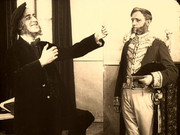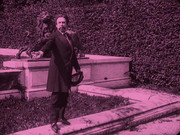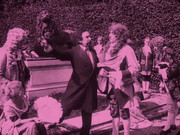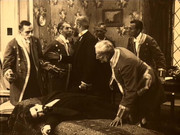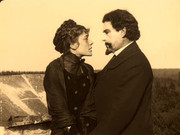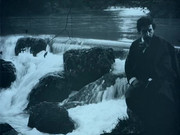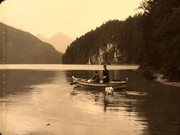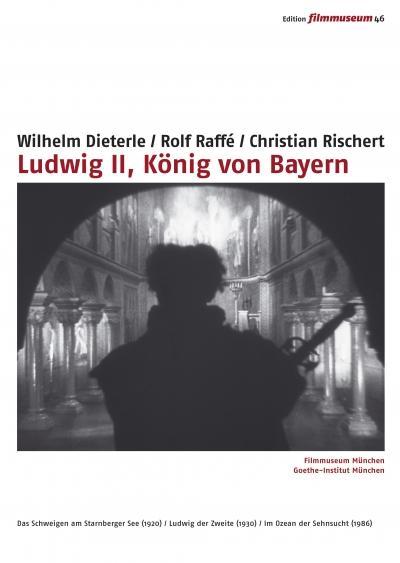
SINOPSIS
Crónica de los últimos días del rey Luis II de Baviera, apodado "el loco".
FICHA ARTÍSTICA
AÑO: 1920
DURACIÓN: 82 minutos
PAÍS : Alemania
DIRECTOR: Rolf Raffé
PRODUCTORA: Indra-Film, Rolf Raffé
FOTOGRAFÍA: Karl Attenberger
REPARTO: Oskar Bayrer, Ferdinand Bonn, Karl Guttenberger, Anton Herrmann, Addi Homburg, Carla Nelsen, Ludwig Wengg, Martin Wilhelm, Toni Zehend
GÉNERO: drama histórico
Código: Seleccionar todo
General
CompleteName : Das schweigen am starnbergersee 1920.avi
Format : AVI
Format/Info : Audio Video Interleave
FileSize/String : 942MB
Duration/String : 1h 22min.
OverallBitRate/String : 1 603Kbps
Encoded_Application/String : VirtualDubMod 1.5.10.2 (build 2540/release)
Encoded_Library/String : VirtualDubMod build 2540/release
Video
ID/String : 0
Format : MPEG-4 Visual
Format_Profile : Advanced Simple@L5
Format_Settings_BVOP/String : 2
Format_Settings_QPel/String : No
Format_Settings_GMC/String : No warppoints
Format_Settings_Matrix/String : Default (H.263)
MuxingMode : Flujo de bits empaquetado
CodecID : XVID
CodecID/Hint : XviD
Duration/String : 1h 22min.
BitRate/String : 1 599Kbps
Width/String : 640pixeles
Height/String : 480pixeles
DisplayAspectRatio/String : 4:3
FrameRate/String : 25,000fps
ColorSpace : YUV
ChromaSubsampling : 4:2:0
BitDepth/String : 8bits
ScanType/String : Progresivo
Bits-(Pixel*Frame) : 0.208
StreamSize/String : 940MB (100%)
Encoded_Library/String : XviD 1.2.1 (UTC 2008-12-04)
Ocho años antes de realizar "El destino de los Habsburgo", ya presentada en este foro, Rolf Raffé dirigía "El silencio en el lago Starnberg", que, curiosamente, por temática y por afinidad con la época en que discurren ambas, tiene no pocos puntos de contacto con la anterior. Por ejemplo, aquí encontramos de nuevo la figura de la emperatriz Elisabeth (Sissí), prima del rey Ludwig (Luis), protagonista de esta cinta.
La película nos relata la trayectoria personal de Luis II desde su ascenso al poder tras la muerte de Maximiliano. Sus primeros contactos con Wagner, su incipiente amor al arte y su primer y único amor, frustrado por las circunstancias que se exponen en el guión. Luego, la acción da un salto de bastantes años, hasta la madurez del rey (no os extrañe que incluso el actor que lo personifica sea distinto). En este punto accedemos a los deseos íntimos del monarca, a su concepción de la vida y al paulatino deterioro de su percepción mental, algo que mueve a sus propios ministros, que ven peligrar sus cargos, a encerrarlo en el castillo de Berg, donde al final, en su lago vecino, encontraría la muerte (punto éste, el del suicidio, que aún hoy no parece estar muy claro).
La estructura del filme, asentada en los escenarios reales donde se produjeron estos acontecimientos, es excelente. Castillos, salones suntuosos, jardines bellísimos y exteriores en la propia Baviera, dan al producto un extraordinario realce. Rolffé incluso se permite componer planos de gran calidad, como el de las hijas de Maximiliano leyendo bajo la estatua de un coloso. La interpretación es muy ajustada, un tanto exagerada en el caso de Ludwig, pero entrañablemente patética en lo que hace a Sissí, Carla Raffé Nelsen, esposa del director, que incluso nos hace sufrir con su aspecto anoréxico, como dicen que fue este personaje en su vida real.
Cinta que profundiza en el mal de soledad que sufría Luis II y la incomprensión que le rodeó en toda su existencia,
La copia está restaurada y, en definitiva, creemos que es una buena ocasión para saber algo más sobre las vivencias de ese alma atormentada que fue el mal llamado "rey loco".
(Eddie Constanti)
Copio un fragmento de un extenso artículo de la siempre muy interesante Senses of Cinema sobre la representación de la figura de Luis II en el cine:
http://sensesofcinema.com/2011/feature- ... 1920–1986/When Raffé made his film in 1920, the event was still within living memory for some Bavarians. Many more would have heard the stories of the mysterious death of the handsome king from their parents and grandparents. Raffé reflects the legendary status of this event in his title, but it is ultimately only a small part of his film, and he does not really investigate the event, or argue for a particular view on Ludwig’s death.
In fact, the first half of the film focuses on Richard Wagner, and his relationship with Ludwig. The film opens on Wagner, reading of the death of Maximilian II. As Wagner reads the reports about the new king, he bemoans, “There will never be a ruler idealistic enough to bring my works to the stage.” So, the opening of the film is structured to highlight this aspect of Ludwig’s reign.
Although some images and titles seem to present Wagner as almost predatory – a very credible interpretation of his relationship with Ludwig – the film is basically sympathetic to Wagner. The scandal about Wagner’s affair with Cosima von Bulow, the wife of his conductor and the daughter of Franz Liszt is completely ignored. And when Ludwig is heartbroken at the collapse of his own relationship with Sophie it is Wagner who consoles him. “Let the magic of art transport you to Valhalla,” Wagner advises him. It appears Ludwig takes this advice instantly to heart, because the next title informs us, “Ludwig’s empire of beauty begins.”
The simplicity of this explanation for Ludwig’s retreat to his solitary castle building, or command performances of operas for him alone is very much the tone of this film. His relationship with his one-time betrothed, the Duchess Sophie, is seen as collapsing because she dared to go paddling bare foot in a small stream and because she perhaps flirted a bit with her portrait painter. There is absolutely no suggestion of Ludwig’s own sexuality, or his inability to advance the relationship.
After having been given such a significant role in the narrative structure at the start, Wagner disappears almost perfunctorily about thirty minutes into the film, abetted by the sleight of hand of a title, “Years have past”. (sic) After some scenes of Ludwig enjoying Wagner’s culture (and Wagner more than enjoying the king’s patronage), Wagner simply tells Ludwig that he must take a journey. “I am accused of being a bad influence on the king.” Next, a committee of Munich citizens rejects plans for a Festival Theatre (surely a reference to Wagner’s dream that did result in the Bayreuth Opera House as the home for his Ring cycle of operas.) Ludwig is hurt by this, “I wanted to make all of you rich, proud and happy. From now on I will erect monuments to my happiness in the wilderness.” And so the building of Linderhof Palace and the Neuschwanstein Castle is explained to us.
Overall, the interest of The Silence at the Starnberg Lake is directly in how much it is a document of its time. Cinematically, it is almost primitive. Many interiors are clearly filmed outdoors because of slow film stock, the acting is theatrical and frequently over demonstrative (at least to our eyes), and the camera work is frequently static. In some cases, postcards are used instead of filming the real rooms inside the picture post-card palaces Ludwig built. It also is basically sympathetic to Ludwig. For all his weaknesses, it would seem Ludwig was still a popular monarch. It was a time when royalty engendered the unquestioning love of a nation simply because it was royalty, and Ludwig, handsome and personable when he became king, certainly enjoyed the love of many of his people. Just two generations on, it was not yet time for a critical or psychological examination of the king. For another thing, the 738-year reign of the house of Wittelsbach in Bavaria had only ended two years earlier in the wash-up to the First World War.
